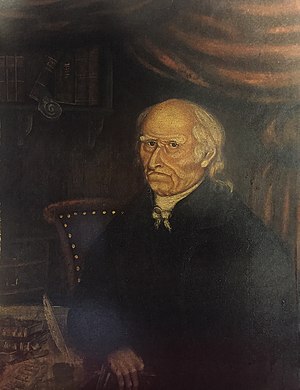| Raid on Lunenburg | |||||||
|---|---|---|---|---|---|---|---|
| Part of the French and Indian War | |||||||
 John Payzant (1749-1834)- taken captive for four years (age 6-10), Perkins House Museum | |||||||
| |||||||
| Belligerents | |||||||
|
|
Wabanaki Confederacy (Mi'kmaq and Maliseet) | ||||||
| Commanders and leaders | |||||||
|
Lieut-Colonel Patrick Sutherland, Dettlieb Christopher Jessen | Charles Deschamps de Boishebert | ||||||
| Strength | |||||||
| 30 | unknown | ||||||
| Casualties and losses | |||||||
| 5 killed, 5 prisoners[1] | none | ||||||
The Raid on Lunenburg occurred during the French and Indian War when Indigenous forces attacked a British settlement at Lunenburg, Nova Scotia on May 8, 1756.[2][3] The indigenous forces raided two islands on the northern outskirts of the fortified Township of Lunenburg, Rous Island and Payzant Island (present-day Covey Island).[4][5] The raiding party killed five settlers and took five prisoners. This raid was the first of nine that the Indigenous and Acadian forces conducted against the Lunenburg peninsula over the next three-years of the war. The Indigenous forces took John Payzant and Lewis Payzant prisoner, both of whom left captivity narratives of their experiences.
- ^ The Native forces claimed they killed 20.
- ^ Diane Marshall in her book Heroes of the Acadian Resistance (Formac, 2011. p. 149) identifies that members of the Mi'kmaq forces were involved in the raid.
- ^ There are competing primary sources regarding the ethnicity of the fighters. Rev. John Payzant states in his Journal in 1810 that there were: "ten Indian[s] from the River St. John. … They took my Mother and her four Children away with them to the River St. John Where we were all ransomed…" This may be a reference to Maliseet (i.e., St. John River Indians). At the same time, DesBrisay relays another primary account in which another son of the Payzant family, Lewis Payzant, identified one of the fighters as Mi'kmaq (DesBrisay, p. 496).
- ^ Rous Island is likely named after Rous Island.
- ^ These islands are located off of the present-day village of Mahone Bay, Nova Scotia. Mahone Bay was not established as a town until the twentieth century. At the time of the raid, this area was simply part of the farm lots of those who had property in the town of Lunenburg. Such was the case with Louis Payzant who owned property in the town of Lunenburg and was killed on his farm lot property on Payzant Island (which is present-day Covey Island) during the raid.
© MMXXIII Rich X Search. We shall prevail. All rights reserved. Rich X Search
